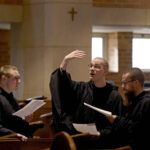Published January 28, 2004
The Catholic Difference
The proposed federal marriage amendment begins with this straightforward affirmation: “Marriage in the United States is exclusively a union of one man and one woman.” Some pro-family critics of the amendment suggest that it defends only the word “marriage,” not the institution of marriage. I’m not persuaded by this criticism, as a matter of law; but in any event these well-meaning critics may be missing some crucial points about language and its effects on culture.
1. It’s not an accident that the proponents of “gay marriage” want to claim the word “marriage.” Gay activists understand that ideas, which have consequences, are formed by words. Everyone knows that, whatever the benefits conferred and whatever the rhetorical chaff surrounding those benefits, a “civil union” is not a “marriage.” Defending the right meaning of words is more than an exercise in semantics; it’s a defense of a public moral culture which recognizes that there are moral truths built into the human condition. One of those truths is that “marriage” – an institution millennia older than the modern state – is “exclusively a union of one man and one woman.” The law’s recognition of that truth is no small thing. If “marriage in the United States is exclusively a union of a man and a woman,” then those who wish to defend the primordial institution of marriage will not be contradicted by the law when we do so.
2. Culture is made of ideas-shaped-by-words. One of the ways communism tried to destroy civil society and democratic culture was through verbal mendacity: “people’s democracy” was the communist euphemism masking the reality of totalitarianism. If the word “democracy” and what it means was worth defending (and it was), so is the word “marriage.”
3. It’s important that the law help keep public discourse about marriage honest. Doing so strengthens the hand of other institutions committed to defending and promoting stable marriages – institutions like families, churches, synagogues, schools, and voluntary associations. These institutions of civil society are, arguably, even more important than the state in building what Maggie Gallagher of the Institute for Marriage and Public Policy calls a “marriage culture.” Their work would be undercut if the legal meaning of “marriage” is changed, i.e., distorted and debased.
4. When gay activists talk about the “benefits” of marriage, they’re talking about entitlements granted by the state. When advocates of “marriage” rightly understood talk about the “benefits” of marriage, we mean, at least in the first instance, something different. As Gallagher puts it, we mean “the good things that happen when husbands and wives are joined in permanent, public, sexual, emotional, financial, and parenting unions” – we mean the good things that happen to couples, and to the children who grow up in stable families. Legal “benefits” are secondary to these goods, which are public goods, not just state-conferred private goodies.
5. If the advocates of “gay marriage” succeed in legally claiming the word “marriage,” the notion that sexual love is simply a matter of satisfying personal “needs” will be further enshrined in our law. We’ve already gone too far down that road, thanks to an out-of-control U.S. Supreme Court and misguided initiatives like “no fault” divorce. To lose the word “marriage” is to lose more than the word “marriage” – it’s to lose any idea of sexual love as an expression of sexual complementarity, permanent commitment, and generativity.
Are “civil unions” a good idea? No, they’re not. But to cite Maggie Gallagher once again, while “civil unions are one unwise step down a path way from a marriage culture,” so-called “gay marriage” is “the end of the road.” The question of “civil unions” can be dealt with on a state-by-state basis, by legislatures rather than by arrogant courts. The question of what “marriage” means requires a binding and unambiguous national solution in which the word “marriage” reflects the human and moral reality of marriage.
Defining “marriage” for what it is is a good in itself. Defining “marriage” for what it is is good for children. And defining “marriage” for what it is erects a barrier to the further dismantling of a public moral culture that, by recognizing the truths embedded in human nature and human action, is capable of sustaining democracy.
George Weigel is Distinguished Senior Fellow of the Ethics and Public Policy Center in Washington, D.C. and holds EPPC’s William E. Simon Chair in Catholic Studies.








